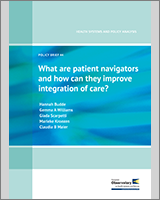NCBI Bookshelf. A service of the National Library of Medicine, National Institutes of Health.
Key messages
- The patient navigator role originated in the USA. It is designed to support patients in finding their way through health and social care systems, and to help them overcome barriers to accessing services.
- Although evidence on the effectiveness of patient navigator programmes is limited, available studies indicate that they can contribute to improving access and continuity of care, seemingly offering a promising approach to better integration of care.
- There are a number of patient navigator initiatives in Europe, albeit with varying levels of implementation. Both these and the USA experience offer opportunities for countries to learn from each other.
- Existing patient navigator programmes typically focus on:
- cancer care, where they help patients to move through the entire care continuum, from prevention to survivorship
- transitional care, where they centre on helping (often older) patients to move between various settings (e.g. hospital and home) or sectors (e.g. health and social care)
- care for vulnerable and disadvantaged populations, such as migrants, ethnic minorities, homeless or uninsured persons, where they can facilitate early detection of diseases and access to care.
- Patient navigators are an example of a skill-mix innovation, whereby new tasks or ways of working are implemented. Navigators come from different backgrounds: they can be qualified health professionals, such as nurses or social workers, or trained lay persons, often recruited from the community that is being targeted.
- Key roles of the patient navigators depend on their skills and experience. Typical tasks might include identifying individual needs and barriers to care, educating patients and communities, and linking patients with different care providers. Professional navigators may carry out more advanced (including clinical) tasks.
- Policy-makers interested in introducing patient navigator programmes should consider macro-, meso- and micro-level factors, all of which will influence implementation.
- Key issues to address include: developing appropriate educational standards; securing support from key stakeholders; putting in place long-term funding to ensure the sustainability of patient navigator programmes.
About the Series
Address requests about publications of the WHO Regional Office for Europe to:
Publications
WHO Regional Office for Europe
UN City, Marmorvej 51
DK-2100 Copenhagen Ø, Denmark
Alternatively, complete an online request form for documentation, health information, or for permission to quote or translate, on the Regional Office web site (http://www.euro.who.int/pubrequest).
All rights reserved. The Regional Office for Europe of the World Health Organization welcomes requests for permission to reproduce or translate its publications, in part or in full.
The designations employed and the presentation of the material in this publication do not imply the expression of any opinion whatsoever on the part of the World Health Organization concerning the legal status of any country, territory, city or area or of its authorities, or concerning the delimitation of its frontiers or boundaries.
The mention of specific companies or of certain manufacturers’ products does not imply that they are endorsed or recommended by the World Health Organization in preference to others of a similar nature that are not mentioned. Errors and omissions excepted, the names of proprietary products are distinguished by initial capital letters.
All reasonable precautions have been taken by the World Health Organization to verify the information contained in this publication. However, the published material is being distributed without warranty of any kind, either express or implied. The responsibility for the interpretation and use of the material lies with the reader. In no event shall the World Health Organization be liable for damages arising from its use. The views expressed by authors, editors, or expert groups do not necessarily represent the decisions or the stated policy of the World Health Organization.
This policy brief is one of a new series to meet the needs of policy-makers and health system managers. The aim is to develop key messages to support evidence-informed policy-making and the editors will continue to strengthen the series by working with authors to improve the consideration given to policy options and implementation.
Box
What is a Policy Brief?
- NLM CatalogRelated NLM Catalog Entries
- Review How can skill-mix innovations support the implementation of integrated care for people with chronic conditions and multimorbidity?[ 2022]Review How can skill-mix innovations support the implementation of integrated care for people with chronic conditions and multimorbidity?Winkelmann J, Scarpetti G, Williams GA, Maier CB. 2022
- The future of Cochrane Neonatal.[Early Hum Dev. 2020]The future of Cochrane Neonatal.Soll RF, Ovelman C, McGuire W. Early Hum Dev. 2020 Nov; 150:105191. Epub 2020 Sep 12.
- Beyond the black stump: rapid reviews of health research issues affecting regional, rural and remote Australia.[Med J Aust. 2020]Beyond the black stump: rapid reviews of health research issues affecting regional, rural and remote Australia.Osborne SR, Alston LV, Bolton KA, Whelan J, Reeve E, Wong Shee A, Browne J, Walker T, Versace VL, Allender S, et al. Med J Aust. 2020 Dec; 213 Suppl 11:S3-S32.e1.
- Review What is the scope of improving immigrant and ethnic minority healthcare using community navigators: A systematic scoping review.[Int J Equity Health. 2016]Review What is the scope of improving immigrant and ethnic minority healthcare using community navigators: A systematic scoping review.Shommu NS, Ahmed S, Rumana N, Barron GR, McBrien KA, Turin TC. Int J Equity Health. 2016 Jan 15; 15:6. Epub 2016 Jan 15.
- Review The role of patient navigators in ambulatory care: overview of systematic reviews.[BMC Health Serv Res. 2021]Review The role of patient navigators in ambulatory care: overview of systematic reviews.Budde H, Williams GA, Winkelmann J, Pfirter L, Maier CB. BMC Health Serv Res. 2021 Oct 28; 21(1):1166. Epub 2021 Oct 28.
- What are patient navigators and how can they improve integration of care?What are patient navigators and how can they improve integration of care?
Your browsing activity is empty.
Activity recording is turned off.
See more...
